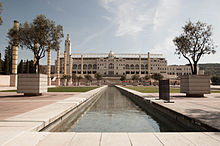People's Olympics

The People's Olympics ( Spanish Olimpiada Popular , Catalan Olimpíada Popular ) was planned as a protest event against the 1936 Summer Olympics in Berlin . It was supposed to take place in Barcelona ( Spain ) during the time of National Socialism in Germany . The left-wing Spanish government decided to boycott the Summer Olympics in Berlin and organize its own Olympics.
Many nations around the world were invited and it was planned to use hotels as an Olympic village . The games were scheduled for July 19 to July 26 and would have ended six days before the start of the Summer Olympics in Berlin. In addition to the usual sporting competitions, competitions in chess , folk dance , music and theater should also take place. Around 6,000 athletes from 22 countries had registered for this People's Olympiad. The largest proportion of athletes should come from the United States , the United Kingdom , the Netherlands , Belgium , Czechoslovakia , Denmark , Norway , Sweden , Switzerland and Algeria , among others . Teams from Germany and Italy whose athletes were in exile had also announced their participation. Many of the athletes were sent by trade unions , workers' associations , socialist and communist parties.
The opening ceremony also marked the end of the Olympics, as the Spanish military put on a coup in Barcelona and the Spanish Civil War broke out on the same day . Some participants could not even reach Barcelona because of closed borders; those who were already in town left as soon as possible. However, at least 200 athletes, most of them Germans and Italians, stayed in Spain and joined the militia to defend the Spanish Republic.
On July 18, 2017, exactly 81 years after the planned opening, the Minister for Foreign Affairs of Catalonia, Raül Romeva , presented three medals to a volunteer and to two 90-year-old athletes who were involved in the preparations for this sporting event.
literature
- Arnd Krüger , James Riordan (Ed.): The Story of Worker Sport. Human Kinetics, Champaign, IL 1996, ISBN 0-87322-874-X .
- Xavier Pujadas, Carles Santacana: Le mythe des jeux populaires de Barcelone. In: Pierre Arnaud (Ed.): Les origines du sport ouvrier en Europe. Paris 1994, pp. 267-277.
- Xavier Pujadas, Carles Santacana: L'altra Olimpiada '36, Barcelona 1990; This: The People's Olympiad, Barcelona 1936. In: International Review for the Sociology of Sport. 27, 1992, pp. 139-149.
- Jeroni Sureda: Sport and international relations in the period between wars (1918–1939): The 1936 popular olympics. In: Alfred Arnaud, Pierre Wahl (eds.): Sports et relations internationales: Actes du colloque de Metz-Verdun. Metz 1994, pp. 97-111.
- Nic Ulmi: Solidarité with the “communards” des Asturies et preparatifs pour l'Olympiade popular. In: Mauro Cerutti et al. (Ed.): La Suisse et l'Espagne de la République à Franco (1936–1946). Lausanne 2001, pp. 209-227.
- André Gounot: Between turning away and rejection: The People's Olympiad in Barcelona 1936 and its relationship to the Olympic movement. In: Sporthistorische Blätter. 7/8, 2000, pp. 195-209.
- Fritz N. Platten: The fight against the Hitler Olympics in 1936. In: Tages Anzeiger Magazin. 22, 1980, pp. 6-12, 44.
See also
Individual evidence
- ↑ The People's Olympiad awards medals 81 years late - volunteers and athletes remember the prevented opening , translated from El País , July 19, 2017